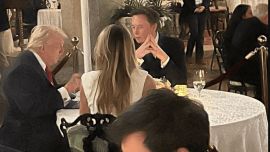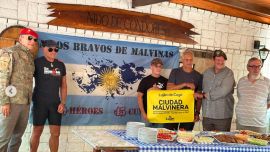A bishop at the age of 49, Archbishop of Buenos Aires and Primate of Argentina at 55, Jorge Ignacio García Cuerva studied philosophy, theology and canon law. He added a law degree to his bow after being prison chaplain in various Buenos Aires Province penitentiaries. After ordination in 1997, he dedicated his life to the poor, mainly in the La Cava and Talar de Pacheco shantytowns.
There was some stir when you were named archbishop of this city by the Pope, the same post he previously held. You have been accused of being Peronist and Kirchnerite. Why do you think it was so controversial?
At the mass in Our Lady of Pilar parish, we read in the Gospel where Jesús asks the disciples: “What do people say about the Son of Man? Who do they say He is?” The disciples respond: “Some say that you are John the Baptist, others Elias or some other prophet.” Jesus then asks: “Who do you say I am?” Peter says at that point: “You are the Messíah, the Son of the living God.” Peter knows for sure who Jesus is because he has shared his whole life with him, the meals, the moments of prayer, he will have witnessed the miracles of Jesus. He was indeed directly called from the lakeshore to be a fisher of men. I believe that his profound knowledge of Jesus came from being with him every day.
I think that somehow when your knowledge of another person is reduced to a photograph or an edited video, you can only have a partial view of that other person. In those crucial days somebody said to me: “Your parents, your siblings, your lifelong friends, the parish communities where you ministered for 20 years, the diocese where you spent almost five years, we know who you are and that’s the important thing.” According to my understanding, nobody’s life is a flash photo – everybody’s life is an open-ended film so I ask everybody to give us the possibility of making ourselves known. At the same time I believe that we have already become accustomed to seeing these reactions towards Pope Francis when, indirectly, some people were annoyed with him. But I insist that it is important to get to know people. I believe that, like I said, our lives are an open-ended film and as Francis told me at that time: “God is greater, do not lose your calm or good humour.” That’s what I’ve tried to apply.
Who is Jorge Ignacio García Cuerva?
Like I always say, I believe that I’m defined by my links. I started off as a son and I’m close to my parents, thank God. I’m the oldest of five children. My grandparents lived a long time, at the age of 29 I still had all four of them. It strikes the attention of some people that in the sermons I preach, I often refer to anecdotes with my grandparents, all of whom lived in this city, in Belgrano on the maternal side and in Caballito followed by Boedo on the paternal side. I make friends easily. I’m grateful to the lifelong friends I’ve made over the years, in secondary school, the faculty and the seminary. I’ve always understood myself in relation to my links.
I’m a very transparent guy, a person who says what he thinks, even when they sometimes say that it is not so prudent or even a good thing to do so. I’m also very sensitive. I know how to enjoy a laugh and sometimes, also, to be strongly moved. Nor would I like to take away another aspect of what I can be, which is a rational guy. I like studying and have not ceased to cultivate my intellectual side. It might also be good to ask some other people who Jorge is.
Some days ago at a Mass you celebrated in Plaza Constitución square, you warned about “some scary messages,” expressing your desire for increasingly more social rights. Does it worry you that various candidates are proposing to reduce rather than extend those rights?
I would like to place that in the context of where I said it. Anybody moving around the Constitución zone at any hour of the day, but far more in the evening or at night, will know that they find themselves in what we commonly call a no man’s land. A great deal of drug-trafficking, many sex workers, very many homeless people, which is an elegant way of putting it because really nobody can live decently in the street. It seems to me that Constitución is the face of Argentina without make-up, which hurts us, as surely do many other places around this city, in Greater Buenos Aires and nationwide.
There I felt almost obliged to say: “Brothers, there are so many of you who are vulnerable and having a rough time, so many who are suffering.” With profound grief, I said: “For God’s sake, let us defend the rights of the poorest.” We think of all those brothers remembered in 2007 by the Document of Aparecida, where we know Cardinal [Jorge] Bergoglio to have participated very actively. That episcopal document spoke of brothers who were not only exploited but disposable. We also need to know that they are our brethren. It cannot be the same to us whether they die or not or whether they have rights or not.
I believe that those of us who try to stay close to life and concrete reality, those of us who take a bus or the subway and link up with people instead of surrounding ourselves with an applauding court will know that our poorest brothers have a name and surname. To me they are not just a number, the 42 percent of poverty, they are a whole lot more than that. When they talk of reducing social rights or those of the poorest in purely numerical and economic terms, it hurts my heart because I immediately think of people I have known all my life or, more recently, at that Mass in Constitución. And you say, brother, I think we have to learn an expression of Francis: “Feet on the ground and hands on the flesh of the brother who is suffering.”
You said: “Count on me for achieving a smart state presence in favour of the most vulnerable and excluded sectors” in your most political sermon. What is your vision of the role of the state and politics?
I believe it to be important that the state exists because that has to do precisely with guaranteeing the rights of the most vulnerable sectors, because otherwise it would be no man’s land. Man can be the wolf of man and we have to warn against that.
At the same time I believe that politics, as proposed by Pius XI and subsequently revived by Francis, is the highest expression of charity. I believe in politics as a power transforming people’s lives, that’s what it seems to me, and we cannot, whatever our political generations, detract from what politics in itself means.
Now I understand that you have to have a smart state presence in the neighbourhoods, which is why I said it in that sermon. By smart presence, I mean recognising reality so that they can, as we might say vulgarly, kick some ass around the neighbourhoods and know what people are demanding, also knowing that it is the organisation of the people to meet their needs which has to be salvaged by the state, requiring a government response.
At times what people need are not new ideas because the people already have the ideas but the structure and funds to be able to carry out their politics –that is smart presence. It is the state which should approach with the humility to listen and learn. In that sense I believe that the Church, the Catholic Church but also other churches and other organisations too, has a root presence in the neighbourhood. We can often be the interlocutor for the state to arrive in the neighbourhood.
A present not absent state, to put it in concrete terms.
A present and smart state because we can have the state present with its own recipes which have nothing to do with the demands of the people. A policy called “the state in your neighbourhood” was applied by the Buenos Aires provincial government and it had some very good ideas, but we realised in the course of the experience that for the neighbours to approach that kind of initiative, it was first necessary to meet them and listen to what they needed so that this project of a present state could also become a smart state.
Do you think that your orientation towards the poor is what motivated Francis to name you as Archbishop of Buenos Aires?
That question would surely be better answered by himself. It is true that he said that he thought of me ... in some conversation we had because it is also true that I did not know the Holy Father while he was in Buenos Aires. I said that I was going to buy a T-shirt reading: “I don’t know Bergoglio.” Everybody was saying that he baptised children in my parish and that I took the subway with the Pope. Well, I did not know him. But in the chats we had over the years and far more since he named me to the Dicastery for Bishops, that, along with my episcopal responsibilities, made us able to share more.
At one point he told me that what sometimes worried him was my commitment or my contact with the reality of poverty and also my more intellectual streak which turned me into a man of two worlds. That might be but if I understand the Pope to be aware of my commitment to this reality, he must also be aware of my commitment to the realities of prison life. I worked with prison problems for 20 years and I’m still the vice-president of the International Committee of Prison Chaplains today. [I’m committed to] the issue of the problems of youth at risk, the vulnerability, drugs and addictions in general. So within that framework the Pope surely knew at least the imprint that I was giving to my ministry.
Points in common with Bergoglio apart from the issue of practically entire careers in very humble neighbourhoods – in the case of Bergoglio, in City shantytowns, in your case in San Isidro, plus the prisons [which he also covered].
Yes, I discovered prison reality in the year I became deacon, in 1997. In reality, that has to do with most prisons being full of poor people and when you live in the poorest neighbourhoods, as was my case, my first year in the shantytown meant that I was forever meeting up with some mother who told me: “This weekend I’m going to visit my son [in jail].”
I remember a lad, a friend, we met the other day on August 7, the Feast of Saint Cajetan. He was a catechist for confirmations and every two or three weeks he would systematically miss the meetings. So one day I asked him why and he told me: “Because I go to visit my brother in Sierra Chica prison.” So I asked him: “Can I join you?” He answered: “Yes, come along.” We took the train from Constitución, getting off in Olavarría and then going by taxi to Sierra Chica Prison. It’s another world, another reality of tremendous alienation and violence. You can already see the violence in the families visiting where they sometimes jostle to be first in line. Violence also after the famous frisking, which is absolutely indecent. The violence which a prison represents in itself, prison is the daughter of injustice.
I dream that someday humanity can think up a superior way of resolving the questions of crime and violence. Just as before illuminated souls came along to resolve the issue of infections with penicillin and antibiotics, I hope that someday humanity will say in the face of the realities of crime and violence in society that something better than prison has come along because I do not believe that prison in itself helps. I always say the same thing, it’s even bizarre that they want to teach you to live in liberty without your being able to make use of that liberty because you have to ask permission even for the door to be opened. It’s like learning how to ride a bicycle without ever climbing on one.
Any point of contact between low-income neighbourhoods and prison?
Absolutely. Sometimes I say that for the kids of our neighbourhoods, their future is unfortunately written with the three C-words, calle (“street”), cárcel (“jail”) or cementerio (“graveyard”) while the slum priests of Buenos Aires propose as their solution three other C-words, chapel, club and colegio (“school”).
I think that Monsignor [Oscar] Romero definitely had a trenchant phrase when he said: “Justice is like snakes, it bites the barefoot.” It’s not that criminals only come from the poor. I believe that more exposure is needed on how the punitive system absorbs the poorest and most vulnerable, those who lack the funds to hire a prestigious law firm, people who in general fill prisons. No way do we want to criminalise poverty or anything of the kind but the concrete reality is that when you enter a prison, you meet kids from the block. A friend once said to me: “You have to revise the catechism of your parish, many are here inside [prison].”
Crime will never be justified – as Saint Augustine said, close to the sinner, far from the sin. You will never find me applauding any crime committed. But I believe and want to dream – permit me to do so, I don’t charge anybody for it – that at some point society merits some other response to the reality of violence and crime which is not prison, which takes away a huge chunk of the budget and does not help to resolve anybody’s life.
What do you think of a possible papal trip to Argentina?
I think it would be beautiful for the shepherd to meet his people. I know the Pope wants to come because he has expressed as much in public and it would be great if it happened, healing, I think. I believe that for very many people there would be enormous jubilation because it has been joyously awaited. When I was Bishop of Río Gallegos where the people, of course, feel themselves to be far from this country’s big cities, also in numerical terms, they always said: “Let him come because although we won’t be able to see him, just knowing that he is in Argentina, we will feel him very close.” I echo what the people want, which is what many people are hoping for so may it happen.
Production: Melody Acosta Rizza and Sol Bacigalupo.



















Comments